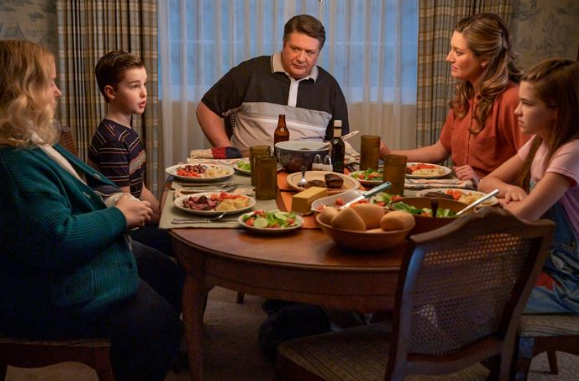
Introduction
The Young Sheldon finale left fans reeling, not only because it marked the end of an era but also because it packed a heavy emotional punch. Between George Cooper Sr.’s heartbreaking death and Sheldon’s surprising decision to get baptized, the episode tied the past, present, and future of the Big Bang Theory universe together in a poignant way.
But did you catch how the finale subtly links back to the show’s very first episode? According to producer Steve Molaro, this wasn’t just a coincidence. It was a deliberate choice that brought Sheldon’s journey full circle while setting the stage for the events of The Big Bang Theory. Let’s dive into the emotional and symbolic connections that made the finale so unforgettable.
George’s Death: The Catalyst for Change
A Loss That Shaped the Family
George Cooper Sr.’s death was inevitable, but that didn’t make it any less devastating. As the family patriarch, his influence loomed large over the series, even when he wasn’t in the room. His passing marked a turning point for every member of the Cooper family, especially Mary and Sheldon.
Mary’s Struggle with Faith and Family
In the wake of George’s death, Mary’s faith deepened. This shift in her character aligns perfectly with the more devout version of Mary seen in The Big Bang Theory. Her decision to baptize Sheldon and Missy underscores her desperation to protect her children, both spiritually and emotionally.
Sheldon’s Baptism: A Surprising Twist
Why Sheldon Agreed to Be Baptized
Sheldon, a staunch atheist throughout most of the series, surprises everyone by going through with the baptism. According to Steve Molaro, this moment reflects Mary’s growing influence and Sheldon’s desire to comfort his grieving mother.
A Nod to the Pilot Episode
This scene echoes one of the most memorable lines from the first episode: “I don’t believe in God, but I do believe in you.” Sheldon’s act of faith isn’t about religion—it’s about love and loyalty to his mother.
Missy’s Reaction: A Heartbreaking Contrast
Missy’s Anger and Disillusionment
While Sheldon complies with Mary’s wishes, Missy rebels, highlighting her anger and disillusionment following her father’s death. This emotional turmoil sets the stage for her character’s struggles in adulthood, as hinted at in The Big Bang Theory.
The Family’s Fractured Dynamics
Missy’s resistance to the baptism and her grief over George’s death reveal the cracks in the Cooper family’s unity. These moments add depth to her character and provide a realistic portrayal of how families cope with loss.
The Emotional Parallels Between Beginning and End
The Full-Circle Moment
From the pilot’s focus on Sheldon’s atheism to the finale’s baptism scene, the show cleverly bookends its narrative with themes of faith, family, and personal growth.
Sheldon’s Growth as a Character
The finale showcases how far Sheldon has come—not just as a genius but as a son and brother. His willingness to compromise for Mary’s sake highlights his emotional development.
Mary’s Transformation: From Relatable Mom to Devout Matriarch
The Road to Big Bang Theory Mary
Mary’s deepening faith after George’s death foreshadows the devout, often overbearing mother we meet in The Big Bang Theory. This transformation feels organic, rooted in her grief and desire to keep her family together.
Why This Shift Matters
Mary’s character arc bridges the gap between the two shows, providing context for her future actions and beliefs.
Easter Eggs and Callbacks Fans Loved
Sheldon’s Baptism and Faith
Sheldon’s baptism isn’t just a plot twist; it’s a callback to earlier episodes where his atheism was a central theme.
Missy’s Struggles Foreshadow Her Future
Missy’s emotional arc hints at the challenges she faces as an adult, adding layers of complexity to her character.
Subtle Nods to The Big Bang Theory
From Sheldon’s line about Mary to references to Caltech, the finale is peppered with Easter eggs that reward longtime fans.
Why the Finale Resonated So Deeply
Balancing Humor and Heartache
The finale strikes a perfect balance between the show’s signature humor and its more poignant moments.
A Tribute to George Cooper Sr.
George’s death isn’t just a plot device—it’s a heartfelt tribute to a character who shaped the series in countless ways.
Conclusion
The Young Sheldon finale is more than just an ending—it’s a reflection on the journey of a family and the growth of its most iconic members. By tying the finale back to the pilot episode, the show delivers a satisfying and emotional conclusion that honors its roots while paving the way for what’s to come in The Big Bang Theory.
Whether it’s Sheldon’s unexpected baptism, Mary’s deepening faith, or Missy’s struggles, every moment in the finale feels purposeful and true to the characters we’ve grown to love.
FAQs
1. Why did Sheldon agree to be baptized in the finale?
Sheldon’s decision was more about comforting his grieving mother than a shift in his beliefs, showing his emotional growth.
2. How does George’s death affect the Cooper family?
George’s death serves as a catalyst for major character developments, particularly for Mary, Sheldon, and Missy.
3. What was the significance of Sheldon’s line, “I don’t believe in God, but I do believe in you”?
This line, echoed in the finale, ties back to the pilot and highlights Sheldon’s love and loyalty to his mother.
4. How does the finale connect to The Big Bang Theory?
The finale bridges the gap between Young Sheldon and The Big Bang Theory, especially through Mary’s transformation and Sheldon’s departure for Caltech.
5. What are the key Easter eggs in the finale?
Fans loved the callbacks to earlier episodes, including references to Caltech, George’s humor, and Sheldon’s atheism.